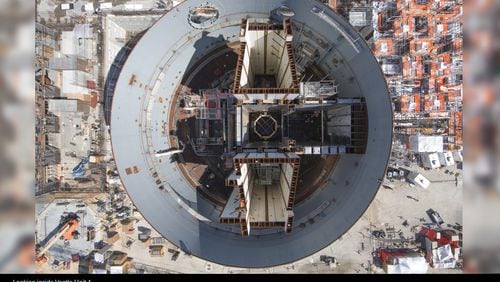Last week’s bankruptcy filing by the Plant Vogtle nuclear project’s key contractor could be chipping away at the credit ratings of Georgia Power and the project’s other partners.
The three major bond rating firms raised caution flags on Georgia Power's debt, citing the likelihood of more delays, cost overruns and other bad news as a result of Westinghouse Electric's March 29 bankruptcy filing.
Westinghouse designed the two new reactorsand and has been overseeing construction at the Vogtle nuclear plant complex near Augusta. Cost overruns on that project and another in South Carolina have saddled Westinghouse and its parent firm, Tokyo-based Toshiba Corp., with $9.9 billion in losses.
The debt of Georgia Power's parent company, Atlanta-based Southern Co., and some of its subsidiaries, also is under review by two of the credit-rating firms, Standard & Poor's and Fitch Ratings.
Meanwhile, Moody's, which already has a lower rating on Southern Co.'s debt, said it is reconsidering its ratings for two other co-owners of the Plant Vogtle project, Oglethorpe Power and MEAG Power. Those companies supply wholesale electricity to dozens of electric cooperatives and cities throughout Georgia.
None of the ratings agencies have cut their debt ratings on the electric utilities yet. That would likely lead to higher interest rates on the companies' future debt issues, and higher costs for their customers.
But the rating firms’ actions to do signal higher risk levels for Georgia Power and its partners, and more likely ratings downgrades for their debt.
The firms changed from a “stable” to a “negative outlook” on the utilities’ debt, meaning their debt is under review for such downgrades.
Currently, Georgia Power and MEAG are rated “A3” and “A2,” respectively, on Moody’s credit grading scale, meaning they’re in the middle range for investment-grade debt. Oglethorpe Power gets a lower “Baa1” rating from Moody’s — still investment grade but a notch lower than Georgia Power.
Southern Co. has a still lower rating, “Baa2,” on Moody’s scale, two notches above junk debt status, or the level at which many pension plans and other large institutional investors won’t buy its bonds. However, the other two bond rating firms give Southern Co. higher marks that are just below Georgia Power’s.
A Southern Co. spokesman said the company is focused on remaining financially sound.
“We remain committed to demonstrating the high degree of financial integrity that has enabled Southern Company to deliver customer and shareholder value over time,” said Schuyler Baehman, with Southern.
Fitch said any rating cut for Georgia Power and Southern Co. will likely be limited to one notch unless the fallout from Westinghouse’s bankruptcy turns out worse than it expects.
“More severe rating actions” could happen, Fitch said in its report, if Georgia Power has to take over running the Vogtle project and Georgia’s state utility regulator, the Georgia Public Service Commission, doesn’t protect it from future cost overruns by allowing it to pass along those costs to its customers.
Under Georgia Power’s current fixed-cost contract, Westinghouse has had to absorb most of the cost overruns for the Vogtle project. So far, it is over three years behind schedule and more than $3 billion over budget.
That contract and another for SCANA Power’s similar project in South Carolina resulted in about 90 percent of the losses for Westinghouse and its parent company, Toshiba, according to Fitch’s report.
But the debt rating firms said Westinghouse will probably use the bankruptcy process to tear up those fixed-price contracts.
If that contract isn’t replaced, Fitch said, it could cause other problems. Georgia Power has borrowed $2.6 billion so far under a federal loan guarantee to build the two reactors. If Westinghouse rejects the contract and it isn’t replaced, the Department of Energy could require Georgia Power to repay the loan in five years, much sooner than originally planned.
Westinghouse is supposed to reveal its intentions for the Vogtle contract by April 28 under an interim agreement, unless it is extended. Under the 30-day interim agreement, Georgia Power is paying Westinghouse $5.4 million a week to keep work going at the Vogtle site while it evaluates whether to continue construction or shut the project down. Georgia Power is also separately paying Fluor Corp., another key on-site contractor.
A shutdown could also be a big risk to Georgia Power’s credit, bond raters said, if the PSC sets a long time period for the utility to recover from customers the billions it has spent so far at Plant Vogtle.
“Whatever option they decide, we would expect they will do so only after receiving full approval from … regulators to recover all investment involved,” Dimitri Nikas, an analyst with Standard & Poor’s, said in a report.
“Absent such approval,” he said, “we would view the companies’ credit quality as significantly compromised, which would lead to lower ratings.”






